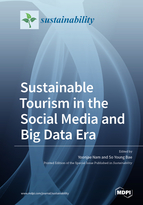Sustainable Tourism in the Social Media and Big Data Era
A special issue of Sustainability (ISSN 2071-1050). This special issue belongs to the section "Tourism, Culture, and Heritage".
Deadline for manuscript submissions: closed (30 April 2020) | Viewed by 110677
Special Issue Editors
Interests: tourism; media; cultural tourism; social network
Special Issues, Collections and Topics in MDPI journals
Special Issue Information
Dear Colleagues,
The aim of this Special Issue is to discuss the major current topics concerning the use of social media and big data for sustainable tourism practices. Tourism is one of the world’s fastest growing industries and has widespread impacts on our environment, society, and economy. It creates economic benefits to host communities, encourages the preservation of cultural and natural heritages, and promotes a global understanding and peace to world citizens. Since tourism includes a variety of destination stakeholders and resources, however, it is crucial to develop tourism management strategies in a socially, culturally, environmentally, and economically sustainable manner. According to UNESCO (http://www.unesco.org/education/tlsf/mods/theme_c/mod16.html), the objectives of sustainable tourism are 1) to appreciate the benefits and problems arising from various forms of tourism, especially in terms of social equity and the environment; 2) to develop a critical awareness of the ways in which tourism can enhance the welfare of people and protect our natural and cultural heritage; 3) to promote a personal commitment to forms of tourism that maximize rather than detract from sustainable human development and environmental quality; and 4) to plan ways of teaching about sustainable tourism.
Social media has enabled system interoperability and dynamic information exchange among users, generating infinite possibilities to develop sustainable tourism strategies strongly based on the interconnectedness fundamental to the ecosystem idea. Also, information ecology for the tourism can be created by interrelationships between tourists, enterprises, technologies, and the surrounding information environment through information strategies, information-seeking behaviors, information management, and information architectures with social media. For example, governmental use of social media for local tourism can provide a map of information ecology, which refers to the interrelationships between relevant online sites (Park et al., 2016).
Big data also leads to develop new types of tourism business models and products through dynamic connections with outside stakeholders, resource and knowledge exchange, new customer relationship modes, innovative revenue streams and new value propositions. And it builds business ecosystem interconnectedness by enabling through collaboration, transparency and trust established with customers and stakeholders (Vecchio et al., 2017).
This Special Issue of Sustainability entitled ‘Sustainable Tourism in the Social Media and Big Data Era’ intends to encourage exciting and innovative interdisciplinary discussions among researchers with regards to major current trends in social media and big data research primarily focusing on sustainable tourism. The following includes the examples of topics:
- Positive or negative impacts of social media / big data on sustainable tourism in terms of social equity and the environment
- Stakeholders’ and/or tourists' uses of social media / big data to promote responsible behaviors for sustainable tourism
- Roles of social media / big data in sustainable tourism practices for protecting our natural and cultural heritage
- New business models with social media/ big data for sustainable tourism
- Connectedness and interrelationships via social media / big data in sustainable tourism for enhancing the welfare of local residents and tourists
- Social changes through enriched interactions via social media and big data technologies in terms of sustainable tourism
- Innovative applications of social media / big data for sustainable tourism development
- Relationships between information ecology via social media / big data and sustainable tourism
- New research methods for sustainable tourism in social media and big data era
References
Park, J.; Lee, C.; Yoo, C.; Nam, Y. An analysis of the utilization of Facebook by local Korean governments for tourism development and the network of smart tourism ecosystem. International Journal of Information Management. 2016, 36, 1320-1327.
Del Vecchio, P.; Mele, G.; Ndou, V.; Secundo, G. Creating value from social big data: Implications for smart tourism destinations. Information Processing and Management. 2018, 54, 847-860.
Prof. Dr. Yoonjae Nam
Prof. Dr. So Young Bae
Guest Editors
Manuscript Submission Information
Manuscripts should be submitted online at www.mdpi.com by registering and logging in to this website. Once you are registered, click here to go to the submission form. Manuscripts can be submitted until the deadline. All submissions that pass pre-check are peer-reviewed. Accepted papers will be published continuously in the journal (as soon as accepted) and will be listed together on the special issue website. Research articles, review articles as well as short communications are invited. For planned papers, a title and short abstract (about 100 words) can be sent to the Editorial Office for announcement on this website.
Submitted manuscripts should not have been published previously, nor be under consideration for publication elsewhere (except conference proceedings papers). All manuscripts are thoroughly refereed through a single-blind peer-review process. A guide for authors and other relevant information for submission of manuscripts is available on the Instructions for Authors page. Sustainability is an international peer-reviewed open access semimonthly journal published by MDPI.
Please visit the Instructions for Authors page before submitting a manuscript. The Article Processing Charge (APC) for publication in this open access journal is 2400 CHF (Swiss Francs). Submitted papers should be well formatted and use good English. Authors may use MDPI's English editing service prior to publication or during author revisions.
Keywords
- Sustainable tourism
- Ecotourism
- Cultural heritage tourism
- Social media
- Big data
- Environment
- Social equity
- Social responsibility
- Connectedness
- Interrelationships






